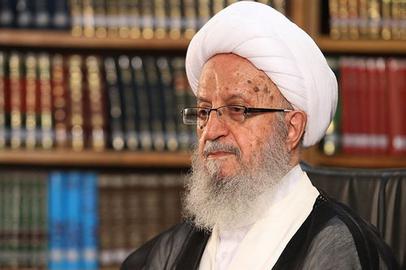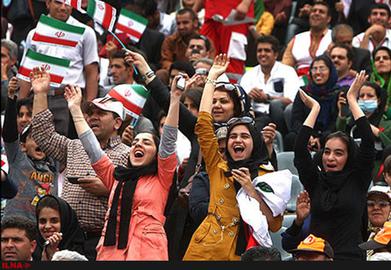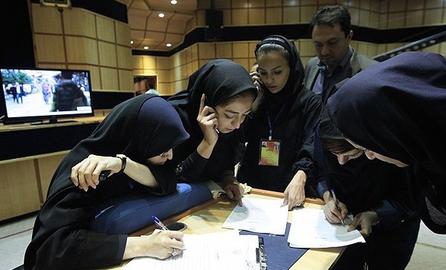Human rights campaigners and sports enthusiasts urging the government to lift the ban on female fans entering stadiums have faced fresh defeat after an influential cleric spoke out against the move.
After Grand Ayatollah Naser Makarem Shirazi, a religious authority in the seminary of Qom, declared his opposition to lifting the ban, a council that advises on policies concerning women declared it had no other option but to withdraw the matter from its agenda, leading to renewed outrage overt the ongoing controversy.
The Socio-Cultural Council of Women and Family (SCCWF), which works under the Supreme Council of the Cultural Revolution, announced the decision on December 8.
Ayatollah Shirazi is a well-known opponent of modernity and the choices and liberties that tend to come with it. In August 2014, he issued a fatwa declaring that high-speed internet was contrary to sharia law and “against moral and human standards.” He is also a holocaust denier, even though his ancestors were Iranian Jews.
Ayatollah Shirazi is a marja, meaning he is one of the highest religious authorities in Shia Islam. He has the authority to rule on legal matters in relation to sharia. Marjas are not merely religious leaders, they are religious “sources of emulation.” All faithful shias are expected to “emulate” a marja in religious matters. A marja is an independent authority and his directives and fatwas do not have to agree with those of another marja, a situation that arises not infrequently.
Shirazi was not the first to declare his opposition to women being allowed into stadiums. Before him, Grand Ayatollah Mohammad Ali Alavi Gorgani, another religious authority in Qom, had also voiced his objection. Among other things, Gorgani also believes music should not be played at gyms and that it is inappropriate for women to take part in “heavy sports.”
Less About Stadiums, More About the Price of Bread
During a lecture to students in early December, Ayatollah Shirazi announced that the presence of women in stadiums “inevitably” leads to morally corrupt acts. “This idea [to allow women into stadiums] was put forward by the previous government as well,” he said, “but both the Supreme Leader and the marjas opposed it. Unfortunately some still want to [implement it], although they know what happened before.” Instead of the government concerning itself with a directive that allows women into stadiums, he suggested it should turn its attention to the price of bread.
In 2006, President Mahmoud Ahmadinejad announced that women would be allowed into stadiums to watch football matches. "The presence of women and families in public places promotes chastity," he said. But a number of top clerics declared their opposition to his decree and a month later the Supreme Leader Ayatollah Khamenei vetoed the idea. Ahmadinejad claimed that initially Khamenei had approved, but when the political climate became inhospitable, Khamenei told him to abandon the idea because “it is not the primary issue for the country.”
In 2015, the government of President Rouhani tried to succeed where Ahmadinejad had failed. The Ministry of Sports drew up a directive that would allow women into stadiums and put it forward for approval by the Supreme National Security Council, but when five marjas — grand ayatollahs Makarem Shirazi, Mohammad Ali Alavi Gorgani, Mohammad Ali Gerami Qomi, Hossein Nouri Hamedani and Lotfollah Safi Golpayegani — declared their opposition, the plan was shelved.
In the most recent debates, it has been the SCCWF’s turn to outline its stance on the “designation of policies regarding women’s presence at sports stadiums.” Speaking to IranWire, the public relations director of the council said, “The views of the marjas are very important to this council. That is why the decision was made.”
Since the decision and its announcement, many Iranians have gone on to social networking sites to respond. Some said that decisions based on the views of one marja is only valid for his own followers and these do not apply to everybody.
“He is respected by all marjas,” said the public relations director about Grand Ayatollah Shirazi. “We showed our respect.” When pushed, the director refused to say more.
Fatwas Cannot Violate the Law
But Mohammad Taghi Fazel Meybodi, a cleric and member of the Assembly of Qom Seminary Scholars and Researchers, disagrees with the SCCWF’s decision to take the matter of female spectators in stadiums off its agenda. “The council is totally in the wrong,” Meybodi told IranWire. “The council must follow the law and the law is decided by the parliament and the Guardian Council. At most, a marja can issue a fatwa for his followers, but even then it must not go against the law of the land. If it does, even his followers must set it aside.”
And in fact, Meybodi, who is considered to be a progressive cleric in Iran, says that Ayatollah Shirazi’s statements did not actually amount to a fatwa. “What he said was his personal opinion, not a fatwa,” he said. “Even his followers are not obliged to follow. Even if he had issued a fatwa, it would have been obligatory only for his own followers. You cannot strip all women of a right because of a fatwa by Mr. Makarem [Shirazi].”
According to him, there is nothing in sharia law that bans women from stadiums. “We must not disregard this issue,” he says. “It must be solved. It is wrong if we disregard it and say it is not a priority. The Socio-Cultural Council of Women and Family is on the wrong track.”
Because the SCCWF works under the supervision the Supreme Council of the Cultural Revolution, most of its members work in institutions controlled by the office of the Supreme Leader. The heads of executive, legislative and judiciary branches of government appoint two members each, as does the Qom Seminary and the Supreme Council of the Cultural Revolution. Other institutions have one representative on the council.
Who Are They?
To understand the views of the members of the council, IranWire looked at the records and the backgrounds of three of its members.
Zahra Ayatollahi is the council’s chair. It was she who announced in September that the matter of allowing women into stadiums had been added to the council’s agenda. Ayatollahi is also an advisor in women’s affairs to Khamenei’s representative for higher education. IranWire requested an interview with her, but she refused. “Ms. Ayatollahi says that the views of the council are communicated through the public relations office,” her office director said.
Zahra Ayatollahi has a seminary education and is a staunch opponent of UNESCO’s Education 2030 Framework for Action. “The 2030 document promotes all sects, including the Baha’is,” she said on a television program.
UNESCO 2030 is part of the UN’s efforts to ensure “sustainable development” of member states through “inclusive and equitable quality education and lifelong learning for all.” The framework was approved in 2015 and signatories are committed to implementing it. In 2016, the government of President Rouhani issued its “National Educational 2030 Document” — and was immediately met with a wave of opposition.
"The UNESCO 2030 education agenda and the like are not agendas that the Islamic Republic of Iran should have to surrender and submit to,” Supreme Leader Ayatollah Khamenei told teachers on May 7. “Why should a so-called international community — which is definitely infiltrated by the corrupt powers — have the right to make decisions for the various cultures among nations?"
A group of 151 MPs in Iran’s Parliament wrote to the president asking him to repeal the document. And on June 13, the Supreme Council of the Cultural Revolution did.
Earlier in 2017, Zahra Ayatollahi drew criticism from women’s and children rights activists on another matter: The marriage of underage girls. met with criticisms by “We must not prevent 13-year-old girls from marrying,” Ayatollahi told the Islamic Republic News Agency in January [Persian link]. She also went on to say that “it is more necessary for girls to learn how to interact with the families of their spouses than learning all kinds of formulas in chemistry, physics and mathematics.”
Whistling in the Stadium
Fereshteh Roohafza is Zahra Ayatollahi’s deputy and holds a Ph.D in electronics from the University of Manchester in the United Kingdom. IranWire’s requests to speak to her were also rejected. However, a review of her statements in the past makes clear her stance towards women’s presence in stadiums. “Unfortunately,” she told a gathering of women aligned with conservative principlist political ideals in April 25, 2015, “they say everywhere that women must be social and have jobs. They say that they should go to stadiums and whistle.” [Persian link] “We live in a world where women are lost in a cesspool,” she added. “They have lost their value and their standing and the presence of women in social and economic arenas is more for show, whereas, according to the Supreme Leader, women, mothers and wives deserve to protect the family and give it peace, not become models and be praised for their sexuality.”
Roohafza also opposes calls to amend Article 1041 of the Iranian Civil Code [PDF] and raise the age of marriage for children. As it exists, the article allows the marriage of girls under 13 and boys under 15 provided a guardian permits the marriage and the court approves it by “taking into consideration the ward’s interest.”
Fingerprints of Feminism
Speaking about the move to reform the law, Roohafza told Mizan, the organ of Iran's judiciary, “One can see the fingerprints of a feminist and western worldview” in the plans.“If these members of the parliament want to prevent possible risks due to marriage at 13, then it would be better for them to say why they do not prevent inevitable risks to women who have not been able to marry at more advanced ages.”
In 2016, when a photograph revealed that actress Taraneh Alidoosti’s had a tattoo tattooed of a feminist symbol, Roohafza called for her to be prosecuted. “The judiciary must definitely intervene,” she said, “because nobody has the right to support a group that promotes an anti-human and anti-sharia behavior. We must not allow these individuals into our culture...They promote abortion — or, to be more exact, they promote the intentional massacre of children.”
Kobra Khazali is the former chair of the Socio-Cultural Council of Women and Family and a current member. “I have tweeted my view about this and I have nothing more to say,” she told IranWire when we contacted her for a comment, before promptly hanging up the phone. Following on from this, IranWire found the tweet to which she referred: “Which has priority for our elite, scholar, jobholder and student women: To demand action on educational policies approved by the government for their scientific and social advancement or becoming spectators for men’s sports?”
Several people responded to her on Twitter. “As an elite [woman], scholar, jobholder and student I must say that the free entry into stadiums and an end to all kinds of sexism is my priority,” wrote one person. “They are not inconsistent,” commented another. “Why do you think that one contradicts the other?”
visit the accountability section
In this section of Iran Wire, you can contact the officials and launch your campaign for various problems


























comments